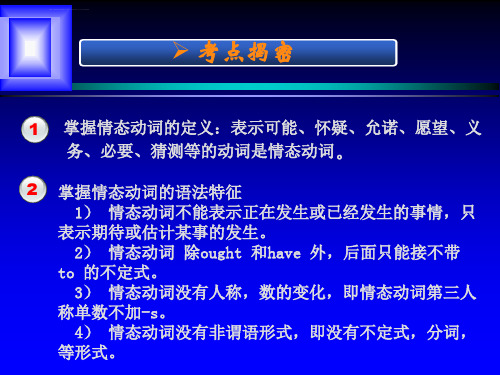(完整版)初中英语情态动词用法归纳课件
合集下载
情态动词(20张PPT)初中英语专项复习课件

看法。
(1)只作情态动词:must;can/could;may/might;ought to
(2)既可作情态动词又可作实义动词:need,dare
((34))既 具可 有作 情情 态态 动动词词某又些可特作征稿稿定助:定hPa动PPvTP,e词T/海h:量asd素ha材tlo持l;/s续hha更odublde;twteirll/would
【知识拓展】
1. must的一般疑问句,肯定回答为Yes, ...must.;否定回答为No, ...needn’t./No, ...don’t have
to.—Must I clean the classroom now? 我必须现在打扫教室吗?
—Yes, you must. 是的,你必须。/No, you don’t have to. /No, you needn’t. 不,你不必。
He promised he would never smoke again. 他承诺他再也不吸烟了。
Their English teacher would tell them stories in
表示过去反复发生的动 English after class.
作或某种倾向
他们的英语老师总是在课后用英语给他们讲故事
新,上千款模板选择总有一
款适合你
知识点二:情态动词的特点
情态动词的特点: (1)情态动词无人称和数的变化(have to除外); (2)情态动词后接动词原形; (3)情态动词的否定式是在其后加not; have to除外 (4)具有助动词的作用,可用来构成否定句、疑问句及用于简明答语; (5)个别情态动词有现在式和稿过定去PP式T两种形式,过去式用来表达更加客气、委 婉的语气,时态性不强,可稿用定于PPT过,海去量、素材现持在续更或将来。
(1)只作情态动词:must;can/could;may/might;ought to
(2)既可作情态动词又可作实义动词:need,dare
((34))既 具可 有作 情情 态态 动动词词某又些可特作征稿稿定助:定hPa动PPvTP,e词T/海h:量asd素ha材tlo持l;/s续hha更odublde;twteirll/would
【知识拓展】
1. must的一般疑问句,肯定回答为Yes, ...must.;否定回答为No, ...needn’t./No, ...don’t have
to.—Must I clean the classroom now? 我必须现在打扫教室吗?
—Yes, you must. 是的,你必须。/No, you don’t have to. /No, you needn’t. 不,你不必。
He promised he would never smoke again. 他承诺他再也不吸烟了。
Their English teacher would tell them stories in
表示过去反复发生的动 English after class.
作或某种倾向
他们的英语老师总是在课后用英语给他们讲故事
新,上千款模板选择总有一
款适合你
知识点二:情态动词的特点
情态动词的特点: (1)情态动词无人称和数的变化(have to除外); (2)情态动词后接动词原形; (3)情态动词的否定式是在其后加not; have to除外 (4)具有助动词的作用,可用来构成否定句、疑问句及用于简明答语; (5)个别情态动词有现在式和稿过定去PP式T两种形式,过去式用来表达更加客气、委 婉的语气,时态性不强,可稿用定于PPT过,海去量、素材现持在续更或将来。
情态动词用法归纳全

五、shall,.should-1shall用于第一人称,征求对方的意见。-What shall we d this evening?-2shall用于第二、三人称,表示说话人给对方的命令、警告、-允诺或威肋。.You shall fail if you don't work hard.警告-2.He shall ave the book when I finish it.允诺-3.He shall be punish d.威胁
情态动词用法归纳全情态动词用法归纳全PPT课件
can,could-1表示能力(体力、知识、技能)-Can you lift this heavy box ?体力-Mary can speak three languages.知识-Can you skate?技 -此时可用be able to代替。-Can只有一般现在时和一般过去式;而be able to则有-更多的 态。-I'll not be able to come this afternoon.-当表示“经过努力才 以做成功某事”时应用oe able-to,不能用Can。如:-He was able to go to t e party yesterday evening in-spite of the heavy rain.
-、can,could-3表示客观可能性(客观原因形成的能力。-They've changed the t metable,so we can go by bus-instead.-This hall can ho d 500 people at least-4表示推测(惊讶、怀疑、不相信的态度),用于疑问句、否定句和感 叹句中。-Can this be true?-This can't be done by him.-How can this be true?
情态动词讲解精ppt课件

例句
will/would
详细描述:will 表示现在的意愿或 预测,would 表示过去的或虚拟 的意愿或预测。
1. I will help you with your project.(我会帮助你完成你的项 目。)
总结词:表示意愿或预测
例句
2. They would have gone to the party if they had known about it earlier.(如果他们早点 知道,他们就会去参加聚会。)
表示意愿
情态动词+动词原形,如 would like to go,表示 某人想要去。
形式变化
基本形式
情态动词的基本形式包括 现在时、过去时和将来时 。
过去式
情态动词的过去式通常是 在基本形式后面加-d或ed,如could have done 、should have done等。
将来时
情态动词的将来时通常是 在基本形式后面加-will或shall,如will be able to 、shall have to等。
may与might的区别与联系
总结词
may表示现在的许可或可能性;might表示过去的可能性或许可。
详细描述
may用于肯定句中,表示许可或可能性,例如“You may use this room.”(你可以使用这个房间。 )“The book may be in the library.”(这本书可能在图书馆里。)might表示过去的可能性,常 用于过去时态的句子中,例如“He might come tomorrow.”(他明天可能来。)
未必、很难说
She might not agree with us.
表示虚拟语气
will/would
详细描述:will 表示现在的意愿或 预测,would 表示过去的或虚拟 的意愿或预测。
1. I will help you with your project.(我会帮助你完成你的项 目。)
总结词:表示意愿或预测
例句
2. They would have gone to the party if they had known about it earlier.(如果他们早点 知道,他们就会去参加聚会。)
表示意愿
情态动词+动词原形,如 would like to go,表示 某人想要去。
形式变化
基本形式
情态动词的基本形式包括 现在时、过去时和将来时 。
过去式
情态动词的过去式通常是 在基本形式后面加-d或ed,如could have done 、should have done等。
将来时
情态动词的将来时通常是 在基本形式后面加-will或shall,如will be able to 、shall have to等。
may与might的区别与联系
总结词
may表示现在的许可或可能性;might表示过去的可能性或许可。
详细描述
may用于肯定句中,表示许可或可能性,例如“You may use this room.”(你可以使用这个房间。 )“The book may be in the library.”(这本书可能在图书馆里。)might表示过去的可能性,常 用于过去时态的句子中,例如“He might come tomorrow.”(他明天可能来。)
未必、很难说
She might not agree with us.
表示虚拟语气
情态动词(17张PPT)初中英语专项复习课件

情态动词表推测也是每年中考的重点,以考查can’t 和must为主,主要在单项选择中考查不同情态动词的辨 析。考生在解答此类试题时,可以从以下几方面着手: ①表示否定的推测:一是断然的否定,此类题一般是考 查情态动词表推测的用法,语境会对所填空给出解释, 据 此 可 以 判 断 是 非 常 肯 定 的 否 定 , 此 时 最 好 用 cannot /can’t;二是表示不能十分肯定或拿不准,此类题一般 也会有相关的语境提示,如I’m not sure、who knows等 ,此时最好用may或might。
表示需要、必须,主 要用于否定句和疑问 句中。needn’t常用 于回答must表请求的 否定回答
—Must I finish my homework now?我必 须现在完成我的家庭作 业吗? —No, you needn’t. 不, 你不需要。
注意 (1) must和have/has to均意为“必须”,常可互 换使用。但have/has to是用于强调客观需要,意为 “必须, 不得不”;must用于表示主观看法, 意为“ 必须, 应该”。如:We’ll have to ask Zhang Hong. 我们必须去问张红了。 We must work hard at school. 在学校我们必须 努力学习。
情态动词本身有一定的意义,但不能独立作谓语, 没有人称和数的变化,后面必须接动词原形。常见的情 态动词有:may, must, need, have to 等,具体用法见下表 :
情态动词
用法
例句
表示能力,意为 Sam can speak English well.
can “能,会”
山姆英语讲得很好。
He could have gone home. 他可能已回家了。
表示需要、必须,主 要用于否定句和疑问 句中。needn’t常用 于回答must表请求的 否定回答
—Must I finish my homework now?我必 须现在完成我的家庭作 业吗? —No, you needn’t. 不, 你不需要。
注意 (1) must和have/has to均意为“必须”,常可互 换使用。但have/has to是用于强调客观需要,意为 “必须, 不得不”;must用于表示主观看法, 意为“ 必须, 应该”。如:We’ll have to ask Zhang Hong. 我们必须去问张红了。 We must work hard at school. 在学校我们必须 努力学习。
情态动词本身有一定的意义,但不能独立作谓语, 没有人称和数的变化,后面必须接动词原形。常见的情 态动词有:may, must, need, have to 等,具体用法见下表 :
情态动词
用法
例句
表示能力,意为 Sam can speak English well.
can “能,会”
山姆英语讲得很好。
He could have gone home. 他可能已回家了。
九年级英语情态动词知识点讲解PPT课件

reading room.
could 意为“很可能”,语气强于may
The story book could be Li Ping's.He likes reading stories.
must can
意为“必定,一定”,语气最 强烈
表可能性,时常用在疑问句中
The book must be Lucy's.Her name is on the cover.
A.can;may
B.must;have to
C.may;must
D.mustn't;must
【温馨提示】专题训练见《强化训练册》B53
—Yes,I can.
A.must
B.should
C.need
D.can
( B )7.(2019·孝感)—May I join the art club,Dad?
—If you have interest,you ________.
A.should
B.can
C.have to
D.must
( C )8.(2019·兰州)The magazine ________ Lucy's.We can see her name on the
—Where can my pen be?—It may be in your desk.
2.情态动词表示否定推测的用法 (1)can't 表示否定推测,语气强烈,意为“一定不;不可能”。如: That can't be Miss Gao.She has gone to Shanghai.那不可能是高老师。她 去上海了。 (2)may not 也表示否定推测,语气不确定,意为“可能不是”。如: It may not be my pen.这可能不是我的钢笔。
could 意为“很可能”,语气强于may
The story book could be Li Ping's.He likes reading stories.
must can
意为“必定,一定”,语气最 强烈
表可能性,时常用在疑问句中
The book must be Lucy's.Her name is on the cover.
A.can;may
B.must;have to
C.may;must
D.mustn't;must
【温馨提示】专题训练见《强化训练册》B53
—Yes,I can.
A.must
B.should
C.need
D.can
( B )7.(2019·孝感)—May I join the art club,Dad?
—If you have interest,you ________.
A.should
B.can
C.have to
D.must
( C )8.(2019·兰州)The magazine ________ Lucy's.We can see her name on the
—Where can my pen be?—It may be in your desk.
2.情态动词表示否定推测的用法 (1)can't 表示否定推测,语气强烈,意为“一定不;不可能”。如: That can't be Miss Gao.She has gone to Shanghai.那不可能是高老师。她 去上海了。 (2)may not 也表示否定推测,语气不确定,意为“可能不是”。如: It may not be my pen.这可能不是我的钢笔。
初中英语语法课件 几种情态动词的基本用法

Need I help you if you get into trouble?
EXERCISES
用适当的情态动词填空
needn’t
1. You
worry about me.
must 2. He looks so pale, he be ill.
3. Plants will die without sunshine.
3.must
表示“必须; 应该” We must finish our homework everyday.
表示“一定”
The book must belong to Jim , there is his name on the cover.
表示“硬要;偏要”
If you must go home, at least call your mom.
7. Students D tell lies. A. may not B. must C. can D. mustn`t
1. You A fail in the exam without hard working. A. will B. would C. mustn‘t D. can
2. He had to give up smoking because of his illness, C he? A. did B. does C. didn’t D. doesn‘t
2. may/might
表示请求、允许、许可, might比may的语气更委婉. 表示推测“可能”, could的可能性比can小。
—May I use the car ? —I’m afraid not. It might not be Jane. She hasn`t dicided to come here yet.
EXERCISES
用适当的情态动词填空
needn’t
1. You
worry about me.
must 2. He looks so pale, he be ill.
3. Plants will die without sunshine.
3.must
表示“必须; 应该” We must finish our homework everyday.
表示“一定”
The book must belong to Jim , there is his name on the cover.
表示“硬要;偏要”
If you must go home, at least call your mom.
7. Students D tell lies. A. may not B. must C. can D. mustn`t
1. You A fail in the exam without hard working. A. will B. would C. mustn‘t D. can
2. He had to give up smoking because of his illness, C he? A. did B. does C. didn’t D. doesn‘t
2. may/might
表示请求、允许、许可, might比may的语气更委婉. 表示推测“可能”, could的可能性比can小。
—May I use the car ? —I’m afraid not. It might not be Jane. She hasn`t dicided to come here yet.
七年级-情态动词ppt

can't have done 的语气比 couldn't have done 要强一些
以could或would提问时,不能再以 could或would作答,而应该用can或will。 如: —Could I borrow your dictionary? —Yes, of course you can.
2.表示“必须”这个意思时,must 和 have to 稍有区别。must着重说明主观 看法,have to 强调客观需要。另外, have to 能用于更多时态。
I don’t like this TV set. We must buy a new one. There was no more bus. They had to walk home.
只作情态动词的 can / could, may / might, ought to, must
可情态可实义的 need, dare 可情态可助动词的 shall / should, will /
would 相当于情态动词的 have to, used to
can 和could:
1) can的主要用法是: A. 表示体力或脑力的能力:
I’d like to…
would表示过去的习惯,后接动词原形,意 为“总是,总会” e.g. He would sit near the fire for hours on winter evenings. e.g. When I was a child, I would go swimming with other children in summer.
dropped it can’t/couldn’t have done: 用于否定句时表否定推断,推
以could或would提问时,不能再以 could或would作答,而应该用can或will。 如: —Could I borrow your dictionary? —Yes, of course you can.
2.表示“必须”这个意思时,must 和 have to 稍有区别。must着重说明主观 看法,have to 强调客观需要。另外, have to 能用于更多时态。
I don’t like this TV set. We must buy a new one. There was no more bus. They had to walk home.
只作情态动词的 can / could, may / might, ought to, must
可情态可实义的 need, dare 可情态可助动词的 shall / should, will /
would 相当于情态动词的 have to, used to
can 和could:
1) can的主要用法是: A. 表示体力或脑力的能力:
I’d like to…
would表示过去的习惯,后接动词原形,意 为“总是,总会” e.g. He would sit near the fire for hours on winter evenings. e.g. When I was a child, I would go swimming with other children in summer.
dropped it can’t/couldn’t have done: 用于否定句时表否定推断,推
初中英语情态动词课件ppt

寒假来临,不少的高中毕业生和大学 在校生 都选择 去打工 。准备 过一个 充实而 有意义 的寒假 。但是 ,目前 社会上 寒假招 工的陷 阱很多
➢ 重难点解析
4 比较may和might
表示允许或请求;表示没有把握的推测;may 放在句首, 表示祝愿。
May God bless you!
He might be at home.
寒假来临,不少的高中毕业生和大学 在校生 都选择 去打工 。准备 过一个 充实而 有意义 的寒假 。但是 ,目前 社会上 寒假招 工的陷 阱很多
➢ 考点揭密
2 may
may表示允许、也许,意为“可以,也许,可能”。对 may的一般问句的回答,肯定回答一般是:Yes, please./ Certainly./ Sure等,否定回答一般是:Please don't./No, you can't/mustn't. might是may的过去式,与may用法类似,常用于过去时 中;用在疑问句中,还可表示委婉客气。
寒假来临,不少的高中毕业生和大学 在校生 都选择 去打工 。准备 过一个 充实而 有意义 的寒假 。但是 ,目前 社会上 寒假招 工的陷 阱很多
➢ 考点揭密
1 掌握情态动词的定义:表示可能、怀疑、允诺、愿望、义
务、必要、猜测等的动词是情态动词。
2 掌握情态动词的语法特征 1) 情态动词不能表示正在发生或已经发生的事情,只
寒假来临,不少的高中毕业生和大学 在校生 都选择 去打工 。准备 过一个 充实而 有意义 的寒假 。但是 ,目前 社会上 寒假招 工的陷 阱很多
➢ 重难点解析
二者所强调的意思不同。一般来说,can强调客观上的可 能性,而may则强调主观上的推测或判断。如:
